Charles Porterfield Krauth Collection (6 vols.)
Digital Logos Edition
Overview
In a parallel situation to the conservative Oxford Movement in the Anglican Church, 300 years after Martin Luther posted Ninety-Five Theses to a church door in Wittenberg, many conservative “Neo-Lutherans” felt the Lutheran church losing its distinctive qualities. Charles Porterfield Krauth was the most prominent leader in American Neo-Lutheranism. In particular, Krauth fought to restore traditional liturgy and the creeds found in The Book of Concord to prominence in the Lutheran Church. These documents, in particular the Augsburg Confession represent a theology that is distinctly Lutheran, yet many American Lutheran’s interpreted these creeds very loosely. Krauth made it his mission as a writer, pastor, and educator to reconstruct a more literal interpretation of these creeds, keeping them in harmony with historical Lutheranism and greater Christianity.
This collection contains Krauth’s translation and commentary on the Augsburg confession and other general creeds, his extended defense of the real presence and other conservative theologies in The Conservative Reformation and its Theology, and Adolph Spaeth’s two-volume biography of Krauth. In the Logos editions, these valuable volumes are enhanced by amazing functionality. Scripture citations link directly to English translations, and important terms link to dictionaries, encyclopedias, and a wealth of other resources in your digital library. Perform powerful searches to find exactly what you’re looking for. With Logos Bible Software, the most efficient and comprehensive research tools are in one place, so you get the most out of your study.

Key Features
- Collects the literary works of America’s foremost Neo-Lutheran leader
- Defends conservative reformation theology
- Contains Adolph Spaeth’s two-volume biography of Krauth
Product Details
- Title: Charles Porterfield Krauth Collection
- Authors: Charles Porterfield Krauth; Adolph Spaeth; Henry E. Jacobs
- Publishers: J. Frederick Smith; Christian Literature Company; General Council Publication House; Lutheran Book Store; Tract and Book Society; J. B. Lippincott Company
- Volumes: 6
- Pages: 2,169
Individual Titles
- A Chronicle of the Augsburg Confession and A Question of Latinity by Charles Porterfield Krauth and Henry E. Jacobs
- Charles Porterfield Krauth, vol. 1 by Adolph Spaeth
- Charles Porterfield Krauth, vol. 2 by Adolph Spaeth
- Infant Baptism and Infant Salvation in the Calvinistic System by Charles Porterfield Krauth
- The Augsburg Confession with the General Creeds by Charles Porterfield Krauth
- The Conservative Reformation and Its Theology by Charles Porterfield Krauth
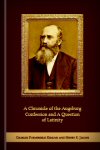
This volume contains Charles Porterfield Krauth’s A Chronicle of the Augsburg Confession and Henry E. Jacobs A Question of Latinity.
Henry E. Jacobs was an American educator and Lutheran theologian. Born in Gettysburg, Pennsylvania, he graduated from Pennsylvania College in 1862 and from the Lutheran Theological Seminary at Gettysburg in 1865. He was professor of systematic theology, and later dean and president at the Lutheran Theological Seminary in Mount Airy.
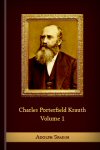
This volume contains the first half of Adolph Spaeth’s expansive biography of Charles Porterfield Krauth, covering his ancestry and childhood up to his time as a pastor in Pittsburgh in 1859.
Adolph Spaeth (1839–1910) was a pastor in Philadelphia from 1864 to 1873, when he took up the role as professor at Lutheran Theological Seminary until his death. He was the president of the General Council of the Evangelical Lutheran Church from 1880 to 1888. He was known as a gifted preacher and a scholar of liturgy and hymnology.
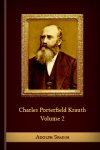
Charles Porterfield Krauth, vol. 2
- Author: Adolph Spaeth
- Publisher: General Council Publication House
- Publication Date: 1909
- Pages: 466
This volume contains the second half of Adolph Spaeth’s expansive biography of Charles Porterfield Krauth, covering the last stretch of his pastoral ministry from 1859 to 1861 up to his journey to Europe, the beginnings of his Martin Luther biography project, and his death.
Adolph Spaeth (1839–1910) was a pastor in Philadelphia from 1864 to 1873, when he took up the role as professor at Lutheran Theological Seminary until his death. He was the president of the General Council of the Evangelical Lutheran Church from 1880 to 1888. He was known as a gifted preacher and a scholar of liturgy and hymnology.
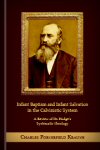
Infant Baptism and Infant Salvation in the Calvinistic System
- Author: Charles Porterfield Krauth
- Publisher: Lutheran Book Store
- Publication Date: 1874
- Pages: 100
This volume contains Charles Porterfield Krauth’s Infant Baptism and Infant Salvation in the Calvinistic System, which responds to Charles Hodge’s Systematic Theology.
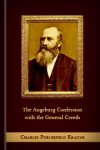
The Augsburg Confession with the General Creeds
- Author: Charles Porterfield Krauth
- Publisher: Tract and Book Society
- Publication Date: 1868
- Pages: 156
This volume contains Charles Porterfield Krauth’s translation, notes, and introduction to the Augsburg confession, the Apostles’ Creed, the Nicene Creed, and the Athanasian Creed.
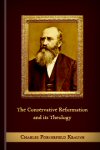
The Conservative Reformation and Its Theology
- Author: Charles Porterfield Krauth
- Publisher: J. B. Lippincott Company
- Publication Date: 1875
- Pages: 873
This volume contains Charles Porterfield Krauth’s The Conservative Reformation and Its Theology, which chronicles the development of Reformation theology and defends conservative doctrines of the Reformation. Specific doctrines discussed include original sin, the person of Christ, Baptism, and the Lord’s Supper.
This title is included in the following collections
You can save when you purchase this product as part of a collection.
Logos 6 Lutheran Bronze Legacy...
$89.99$89.99Logos 5 Lutheran Bronze Legacy...
$89.99$89.99Logos 6 Lutheran Silver Legacy...
$349.99$349.99Logos 5 Lutheran Silver Legacy...
$349.99$349.99
- $849.99
- $849.99
- $1,499.99
- $2,999.99
- $4,749.99$3,562.49
- $4,749.99
- $4,749.99
- $23,999.99$17,999.99
- $24,999.99
About Charles Porterfield Krauth
Charles Porterfield Krauth (1823–1883) was a Lutheran pastor, theologian, and educator. Born in Martinsburg, Virginia, Krauth graduated from Gettysburg College and Lutheran Theological Seminary at Gettysburg. He then spent 20 years pastoring Lutheran congregations across Virginia and Pennsylvania. In 1861 he left full-time ministry to become the editor of a theological journal, The Lutheran. It became his express goal as editor to restore the Book of Concord to prominence in Lutheran church life. Krauth became professor of systematic theology at the General Council’s seminary. He authored the General Council’s Fundamental Articles of Faith and Church Polity, as well as its congregational constitution. In 1868 he became professor of mental and moral philosophy at the University of Pennsylvania, where he later became vice-provost. In 1880 he visited Europe to explore the scenes of Martin Luther’s life in preparation for a biography of the seminal reformer. This biography was left unfinished at the time of Krauth’s death in 1883.